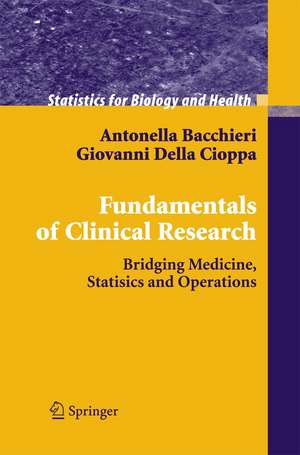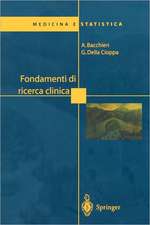Fundamentals of Clinical Research: Bridging Medicine, Statistics and Operations: Statistics for Biology and Health
Autor Antonella Bacchieri, Giovanni Della Cioppaen Limba Engleză Paperback – 28 noi 2014
| Toate formatele și edițiile | Preț | Express |
|---|---|---|
| Paperback (1) | 783.04 lei 43-57 zile | |
| Springer – 28 noi 2014 | 783.04 lei 43-57 zile | |
| Hardback (1) | 1105.77 lei 43-57 zile | |
| Springer – 15 dec 2006 | 1105.77 lei 43-57 zile |
Din seria Statistics for Biology and Health
- 20%
 Preț: 633.23 lei
Preț: 633.23 lei - 17%
 Preț: 352.01 lei
Preț: 352.01 lei - 20%
 Preț: 758.04 lei
Preț: 758.04 lei - 20%
 Preț: 1379.34 lei
Preț: 1379.34 lei - 18%
 Preț: 1394.84 lei
Preț: 1394.84 lei - 18%
 Preț: 883.59 lei
Preț: 883.59 lei - 5%
 Preț: 843.91 lei
Preț: 843.91 lei -
 Preț: 397.16 lei
Preț: 397.16 lei - 20%
 Preț: 1002.67 lei
Preț: 1002.67 lei - 18%
 Preț: 1395.32 lei
Preț: 1395.32 lei - 5%
 Preț: 1102.10 lei
Preț: 1102.10 lei - 5%
 Preț: 874.83 lei
Preț: 874.83 lei - 15%
 Preț: 657.39 lei
Preț: 657.39 lei - 18%
 Preț: 960.93 lei
Preț: 960.93 lei - 15%
 Preț: 585.90 lei
Preț: 585.90 lei - 5%
 Preț: 852.69 lei
Preț: 852.69 lei - 18%
 Preț: 903.62 lei
Preț: 903.62 lei - 5%
 Preț: 721.40 lei
Preț: 721.40 lei - 15%
 Preț: 653.46 lei
Preț: 653.46 lei - 18%
 Preț: 2114.90 lei
Preț: 2114.90 lei - 18%
 Preț: 1108.99 lei
Preț: 1108.99 lei - 5%
 Preț: 821.39 lei
Preț: 821.39 lei - 5%
 Preț: 849.02 lei
Preț: 849.02 lei - 15%
 Preț: 653.14 lei
Preț: 653.14 lei - 18%
 Preț: 958.56 lei
Preț: 958.56 lei - 5%
 Preț: 722.69 lei
Preț: 722.69 lei - 18%
 Preț: 728.74 lei
Preț: 728.74 lei - 18%
 Preț: 943.22 lei
Preț: 943.22 lei - 5%
 Preț: 1092.43 lei
Preț: 1092.43 lei - 15%
 Preț: 594.21 lei
Preț: 594.21 lei - 5%
 Preț: 377.87 lei
Preț: 377.87 lei - 18%
 Preț: 1124.60 lei
Preț: 1124.60 lei - 18%
 Preț: 1220.12 lei
Preț: 1220.12 lei - 15%
 Preț: 632.98 lei
Preț: 632.98 lei - 18%
 Preț: 1394.84 lei
Preț: 1394.84 lei -
 Preț: 389.11 lei
Preț: 389.11 lei - 18%
 Preț: 959.98 lei
Preț: 959.98 lei
Preț: 783.04 lei
Preț vechi: 824.25 lei
-5% Nou
Puncte Express: 1175
Preț estimativ în valută:
149.85€ • 155.56$ • 124.95£
149.85€ • 155.56$ • 124.95£
Carte tipărită la comandă
Livrare economică 24 martie-07 aprilie
Preluare comenzi: 021 569.72.76
Specificații
ISBN-13: 9788847056336
ISBN-10: 8847056330
Pagini: 372
Ilustrații: XXV, 343 p.
Dimensiuni: 155 x 235 x 20 mm
Greutate: 0.52 kg
Ediția:2007
Editura: Springer
Colecția Springer
Seria Statistics for Biology and Health
Locul publicării:Milano, Italy
ISBN-10: 8847056330
Pagini: 372
Ilustrații: XXV, 343 p.
Dimensiuni: 155 x 235 x 20 mm
Greutate: 0.52 kg
Ediția:2007
Editura: Springer
Colecția Springer
Seria Statistics for Biology and Health
Locul publicării:Milano, Italy
Public țintă
Professional/practitionerCuprins
Viability of Biological Phenomena and Measurement Errors.- Distinctive Aspects of a Biomedical Study Observational and Experimental Studies.- Observational Studies.- Defining the Treatment Effect.- Probability, Inference and Decision Making.- The Choice of the Sample.- The Choice of Treatments.- Experimental Design: Fallacy of “Before-After” Comparisons in Uncontrolled Studies.- Experimental Design: the Randomized Blinded Study as an Instrument to Reduce Bias.- Experimental Designs.- Study Variants Applicable to More than One Type of Design: Equivalence Studies, Interim Analyses, Adaptive Plans and Repeated Measurements.- The Drug Development Process and the Phases of Clinical Research.
Recenzii
From the reviews:
"The first three chapters of the book provide important foundational information. ...Chapters 4, 6, and 7 are the stars of this book. The authors lay out in great detail the complex process of arriving at a measure of treatment effect. We statisticians are so used to having this handed to us that we never think about how important this process is. The authors also provide pragmatic advice about whether to select your sample to be mildly ill or seriously ill, or whether you should choose healthy volunteers instead." Steve Simon, Journal of Biopharmaceutical Statistics, Issue 2, 2008
"Main aim of this book is to explain the three pillars of clinical research: medicine, statistics and logistics in an easily digestible manner. … A very lucid and well-structured account of the basic statistical and epidemiological concepts is definitely a great plus point of this book … . I have truly enjoyed reading this book and it gives a refreshing and focused outline of the clinical research. I would recommend all clinicians who aspire to be/are involved in clinical research to give it an audience." (Faisel Yunus, Journal of Applied Statistics, Vol. 35 (2), 2008)
"Readership: … the clinical researcher who wants an intelligent discussion on the (mainly) statistical aspects of clinical research. It would make a useful background reading for a course in clinical trials. … The book is well written. … is essentially an extended essay on the application of statistical inference in clinical research." (M. J. Campbell, International Statistical Review, Vol. 75 (3), 2007)
"A comprehensive introductory text that addresses statistical methods and operational issues in the conduct of clinical research. ... The authors avoid overuse of mathematical formulas and carefully balance practical and theoretical aspects of clinical research. Format and writing clarity are good, with numerous examples used to illustrate conceptsthroughout the text. ... Recommended Readership: Doctoral and postdoctoral trainees and junior or research inexperienced clinical researchers and scientists." (Paul V. Targonslci, Mayo Clinic Proceedings, Vol. 82 (11), November, 2007)
"The text is directed toward physicians conducting clinical trials research and statisticians consulting on clinical trials. … I recommend it for physicians, statisticians, and technical personnel with a novice knowledge level of clinical trials. At the same time it could be used as a text for an introductory graduate level class in clinical trials. To those entering the field of clinical trials I wholeheartedly recommend Fundamentals of Clinical Research … as it provides a foundation pertinent to a variety of aspects of clinical trials research." (Gregory E. Gilbert, The American Statistician, Vol. 63 (1), February, 2009)
“The authors’ book on methods and issues in clinical research is directed at biomedical researchers as well as statisticians. … it addresses the integration of medical and statistical components of clinical research in order to create a logical flow of reasoning understandable for both the medical/biological and the statistical expert. … The whole book is written in a convenient, comprehensible style … and is therefore useful also for readers having more advanced knowledge and experience in the field of clinical trials.” (Lutz Edler, Zentralblatt MATH, Vol. 1210, 2011)
"The first three chapters of the book provide important foundational information. ...Chapters 4, 6, and 7 are the stars of this book. The authors lay out in great detail the complex process of arriving at a measure of treatment effect. We statisticians are so used to having this handed to us that we never think about how important this process is. The authors also provide pragmatic advice about whether to select your sample to be mildly ill or seriously ill, or whether you should choose healthy volunteers instead." Steve Simon, Journal of Biopharmaceutical Statistics, Issue 2, 2008
"Main aim of this book is to explain the three pillars of clinical research: medicine, statistics and logistics in an easily digestible manner. … A very lucid and well-structured account of the basic statistical and epidemiological concepts is definitely a great plus point of this book … . I have truly enjoyed reading this book and it gives a refreshing and focused outline of the clinical research. I would recommend all clinicians who aspire to be/are involved in clinical research to give it an audience." (Faisel Yunus, Journal of Applied Statistics, Vol. 35 (2), 2008)
"Readership: … the clinical researcher who wants an intelligent discussion on the (mainly) statistical aspects of clinical research. It would make a useful background reading for a course in clinical trials. … The book is well written. … is essentially an extended essay on the application of statistical inference in clinical research." (M. J. Campbell, International Statistical Review, Vol. 75 (3), 2007)
"A comprehensive introductory text that addresses statistical methods and operational issues in the conduct of clinical research. ... The authors avoid overuse of mathematical formulas and carefully balance practical and theoretical aspects of clinical research. Format and writing clarity are good, with numerous examples used to illustrate conceptsthroughout the text. ... Recommended Readership: Doctoral and postdoctoral trainees and junior or research inexperienced clinical researchers and scientists." (Paul V. Targonslci, Mayo Clinic Proceedings, Vol. 82 (11), November, 2007)
"The text is directed toward physicians conducting clinical trials research and statisticians consulting on clinical trials. … I recommend it for physicians, statisticians, and technical personnel with a novice knowledge level of clinical trials. At the same time it could be used as a text for an introductory graduate level class in clinical trials. To those entering the field of clinical trials I wholeheartedly recommend Fundamentals of Clinical Research … as it provides a foundation pertinent to a variety of aspects of clinical trials research." (Gregory E. Gilbert, The American Statistician, Vol. 63 (1), February, 2009)
“The authors’ book on methods and issues in clinical research is directed at biomedical researchers as well as statisticians. … it addresses the integration of medical and statistical components of clinical research in order to create a logical flow of reasoning understandable for both the medical/biological and the statistical expert. … The whole book is written in a convenient, comprehensible style … and is therefore useful also for readers having more advanced knowledge and experience in the field of clinical trials.” (Lutz Edler, Zentralblatt MATH, Vol. 1210, 2011)
Textul de pe ultima copertă
The scope of clinical research is to evaluate the effect of a treatment on the evolution of a disease in the human species.The treatment can be pharmacological, surgical, psychological/behavioral or organizational/logistic. The disease, intended as an impairment of a state of well-being or a condition capable of provoking such impairment over time, can be universally accepted as such (e.g. a cancer or a bone fracture) or perceived as such only by limited groups of individuals in a given cultural context (e.g. hair loss or weight gain). The course of the disease that ones wishes to change can be the one with no intervention or, more frequently, the one observed with the available treatment. The evaluation of the effect of a treatment on the course of a disease is a lengthy process, which progresses in increasingly complex stages.
A detailed coverage of the logistic, administrative and legal aspects of clinical research is outside the scope of this book. However, throughout the book we keep reminding the reader of these aspects because, as already mentioned, we firmly believe they have a crucial role in determining the success of a study. The history of clinical research is paved with relics of studies started with great pomp, riding great ideas and great hopes, which drowned miserably because of inadequate logistical preparation. In our experience, the excessive complexity of a clinical trial is the single most frequent cause of failure: the study is perfect on paper, but impossible to implement by patients and staff alike. The distance between the principal investigators and the reality of clinical research in its day-to-day practice is often the main cause of such disasters. We warmly encourage everyone involved in clinical research to get involved in the logistics of a study, learning from colleagues responsible for its practical conduct (clinical research associates, data managers, etc.) and to take part, in person, in the practical implementation of atrial before attempting to design a study protocol.
The book ends with a brief description of the drug development process and to the phases of clinical development.
The authors
A detailed coverage of the logistic, administrative and legal aspects of clinical research is outside the scope of this book. However, throughout the book we keep reminding the reader of these aspects because, as already mentioned, we firmly believe they have a crucial role in determining the success of a study. The history of clinical research is paved with relics of studies started with great pomp, riding great ideas and great hopes, which drowned miserably because of inadequate logistical preparation. In our experience, the excessive complexity of a clinical trial is the single most frequent cause of failure: the study is perfect on paper, but impossible to implement by patients and staff alike. The distance between the principal investigators and the reality of clinical research in its day-to-day practice is often the main cause of such disasters. We warmly encourage everyone involved in clinical research to get involved in the logistics of a study, learning from colleagues responsible for its practical conduct (clinical research associates, data managers, etc.) and to take part, in person, in the practical implementation of atrial before attempting to design a study protocol.
The book ends with a brief description of the drug development process and to the phases of clinical development.
The authors
Caracteristici
Here is a new book on methods and issues in clinical research










